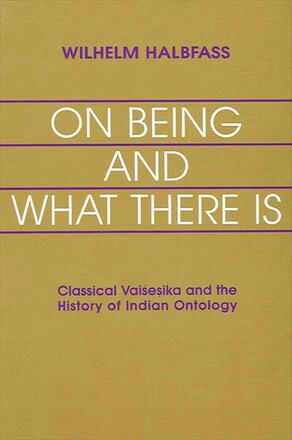
On Being and What There Is
Classical Vaiśeṣika and the History of Indian Ontology
Wilhelm Halbfass (1940–2000) was Professor of Indian Philosophy at the University of Pennsylvania. He is the author of India and Europe: An Essay in Understanding; Tradition and Reflection: Explorations in Indian Thought; and the editor of Philology and Confrontation: Paul Hacker on Traditional and Modern Vedanta; all published by SUNY Press.
Reviews
"It is a comprehensive study of some of the most difficult and poorly understood--yet central--issues of classical Indian philosophy. It covers an amazingly broad range of texts, explaining and analyzing some materials that have never been studied. It offers a synthetic picture of Vaisaesontology and convincingly explicates its 'genius. '
"No one has ever explained the concepts of substance, being, and universal in Vaisaesas comprehensively and accurately as Halbfass has done. No one has ever focussed on 'the conceptualization of being,' as he has done here. Nor has anyone ever analyzed the writings of Vyomasiva, Sridhara, and Udayana as thoroughly and completely. No one has brought in the rich Jaina materials to this extent.
"To me, it is fascinating--one of the best books on Indian philosophy I have ever read. It is a splendid work of constructive scholarship, an authoritative source of information about Indian philosophy that will be consulted for many years to come. " -- John Taber, University of New Mexico, Albuquerque
"This work is characteristic of the kind of scholarship we have come to expect from Halbfass--learned, insightful, comprehensive, and authoritative. " -- Richard W. Lariviere, University of Texas
"I strongly believe this is going to be a most valuable addition to the literature on Vaisaes It will also be a much needed text for courses on Indian philosophy at undergraduate and graduate levels. " -- J. N. Mohanty, Temple University
"This is undoubtedly an insightful work from the pen of an outstanding scholar; it is extremely interesting, rich in ideas and arguments, and thoroughly documented. " -- D. P. Chattopadhyaya, Jadavpur University